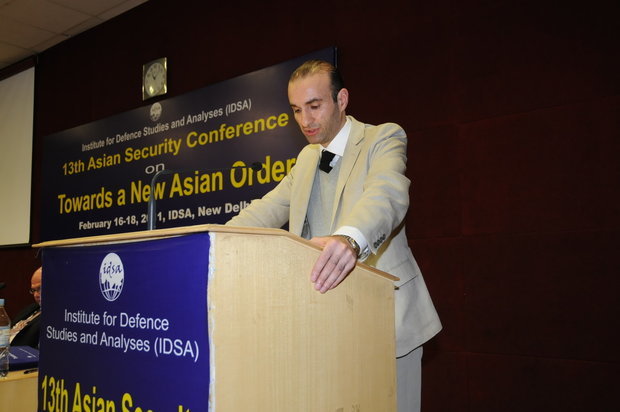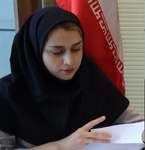Professor in Global Thought and Comparative Philosophies and Chair of the Centre for Iranian Studies at the London Middle East Institute, also adds that “There is something enticing about Persia, in many ways it is unique in terms of civilizational complexity.”
Here is the full text of the interview:
How much do western scholars know about Iranian culture and civilization?
A: I think the “western” scholar has faded away a long time ago. Knowing Iran or trying to capture some truths about the country doesn’t have much to do with location, social and/or national background. Any person can study and understand Iran if he or she equips herself with the knowledge to do so. In academia, in the universities all over the world, including in many universities in North America and Western Europe, there are scholars who have excellent knowledge about Iran. In Western Europe in particular, there is still the freedom to think critically about everything in the world, including Iran, without censorship by the state. Indeed, it is this context which explains that some of the better scholarship about Iran is produced outside of the country. There is a long history in Iran of such “exile” scholarship, not least because of the psycho-nationalist suppression of academic freedoms by successive Iranian states. Don’t forget that the biggest philosophers and poets in world history, from Ibn Sina, Ibn Arabi to Mowlana, roamed around because they were persecuted.
Why is Iranian studies important for the west?
A: Iran is one of the most important countries in human history. There is something enticing about Persia, in many ways it is unique in terms of civilizational complexity. The idea of Iran or Persia has been around since the beginning of history, so there are ancient archives about the country. From Herodotus who famously said that Persians only decide when they are drunk on wine, to the modern obsession with Iran, which has both cultural, economic and political manifestations: Persia solicits strong feelings. But Iranian Studies is not at all dominated by “western scholars”. It is largely in the hand of scholars with a background in Iran, who speak the language and know the culture of the country. It is necessary that these scholars are supported, so that they can produce better knowledge about the country for society and other interested stakeholders. There shouldn’t be any paranoia in Iran about academics and scholars because we are regulated by the standards of truth. The difference is between good and bad scholarship and not between political proclamations and ideological strategies. The standards of academia still hold and they marginalise political manipulation in a very effective way. If you want to find the truth about Iran, the university is still the best place to search for it.
There is of course a formal and informal nexus between power and knowledge everywhere in the world. But it is up to us intellectuals to position our research beyond such confines, and the mainstream political consensus. This is a matter of the individual integrity and principle of any intellectual anywhere in the world. There is then a constant battle for the truth and it is entirely viable and possible to speak truth to power. The first pre-condition is the possibility of freedom. This possibility will be there until human societies exist, because our intrinsic human instinct seeks liberty from force.
Some argue that comparable to Orientalism that was study of east for control it, Iranian studies in the west is for control of Iran, finally. What is your opinion?
I largely disagree with the idea that Iranian Studies exists to control Iran. Orientalism continues to be real, but Edward Said himself was located in the “west”, in New York which was at that time the centre of the “free world”, as opposed to now when it is the financial centre of a country in political and economic decline. The United States, both in terms of culture including universities and economically is in decline exactly because it is increasingly difficult to think freely in that country. The Trump administration, the epitome of an Orientalist nightmare, has pushed the former leader of the free world into a cultural abyss. Today, the freedom to think in the United States is certainly conscribed.
And yet Said, exactly because of his critical mind and because of the freedom he had to write about such matters, came up with this powerful idea of Orientalism and he was absolutely right about its repercussions. But the book was published in 1978 and a lot of time has passed since then. Societies in Europe and North America are mixed. The academic elite is by far more diverse and international than during Said’s time. Even my own institution, SOAS, has a history connected to the British Empire. But today it is probably the most progressive and critical academic institution focusing on Iran and the region in the world. The composition of academics and students is incredibly diverse and multicultural, reflective of the cosmopolitan atmosphere that London oozes. Don’t get me wrong. The battle for the truth about Iran is a fierce, awesome, strenuous and stressful one. But the possibility of standing in this battlefield of truth has been there. I will not be swayed by the cynics about this. The battle, then, is not so much within Iranian Studies but outside of the Ivory Tower within society where there continues to be this subliminal “Orientalist” consciousness – indeed there is a lot of bigotry and racism against “the other” spearheaded by a powerful right-wing coterie symbolised by illiterate and angry people such as Donald Trump. This cultural context, which is always also resisted by institutions and individuals, does have an effect on policy and public perceptions of Iran which are largely negative in the mainstream media.
What is your suggestion for introducing the better of Iran culture and civilization in the west?
First and foremost, the Iranian Foreign Ministry, through its cultural attaches, should foster close relations between scholars inside of Iran and those residing outside. In a joint effort, one could institutionalize “Hafiz Institutes” all over the world much like the model of the Goethe Institute for Germany and the Confucius Institute which operates under the wing of the Chinese Ministry of Education.
Second, there needs to be a “Diaspora ministry” in the Iranian government which should be equipped with enough authority by the other ministries to foster closer relations between the global Iranian Studies community.
Interview by: Javad Heirannia
MNA/TT


























Your Comment